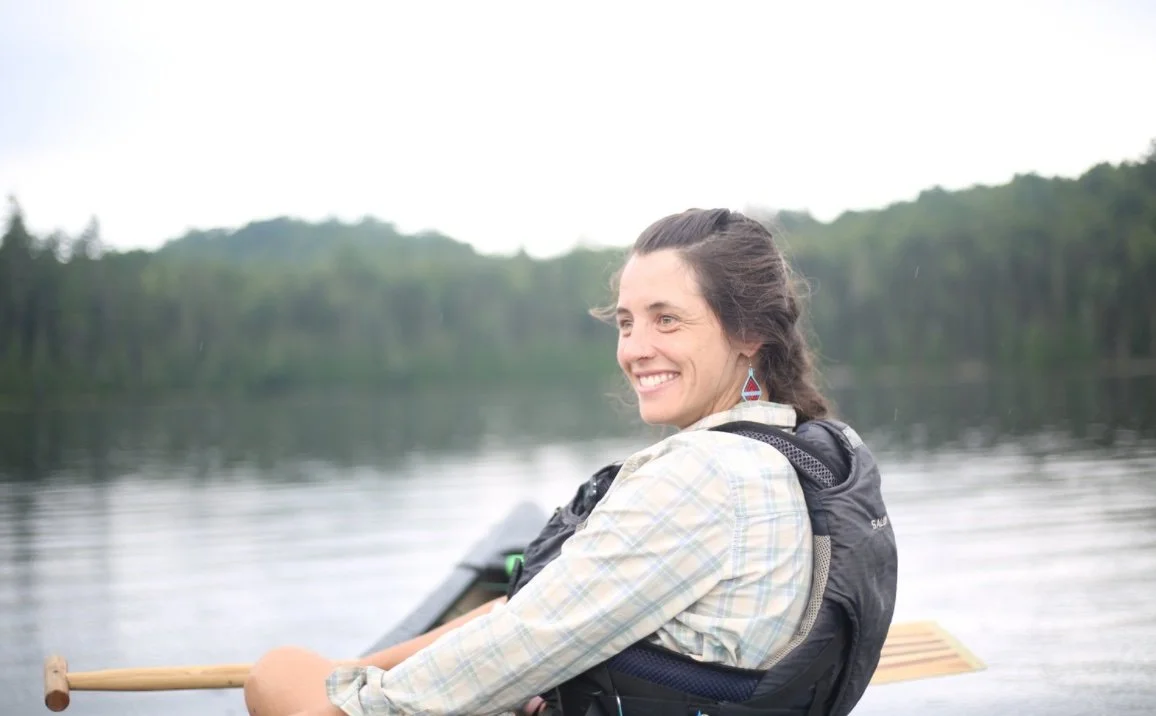Meet Our Speakers - Keira Loukes
Name: Keira Loukes
Title: Assistant Professor, School of Outdoor Recreation, Parks & Tourism, Lakehead University
Education: PhD University of Ottawa
Q: Tell us a little about yourself and how you got started with Indigenous food sovereignty in northern Ontario.
Food has really fascinated me – it connects everything; ecology, culture, economics, and politics. I worked a few short stints on some farms and eventually did my Master’s studying the system of rice intensification in Nepal. At the time, I was connected with the Four Directions Aboriginal Student Centre at my university, and the director pointed out that our local communities have a lot to think about when it comes to food and political sovereignty. She said, “We can’t be sovereign unless we can feed ourselves.” This statement really helped me pause and rethink the direction of my research.
I took time away from academia and worked as a high school teacher in places such as the Treaty 9 region in northern Ontario. In general, the cost of food in northern Ontario’s grocery stores is inaccessibly high. I remember seeing $16 strawberries and then the Nutrition North subsidy reducing the cost by only 7 cents. There was hardly any fresh food – the grocery store felt scarce. At the same time, I would attend gatherings where people were plucking geese and pulling fish from the river, and the community felt abundant in fresh food. It was such a contrast, and it got me thinking about the different approaches to making food more accessible to community members. I was thinking again about all those ecological, political, economic, cultural and spiritual elements of food security and food sovereignty. I eventually found my way and connected with a professor at the University of Ottawa who was studying food sovereignty in the Treaty 9 region, and have been working on it every since.
Q: Your research is primarily focused on food sovereignty in northern Ontario. What are some of the main structures of power that you see interacting with food systems?
Although it all feels really complicated, I keep coming back to the issue of land. I’m not arguing that it used to be easy for Indigenos people to live off the land in northern Ontario, but they generally had enough to eat. Indigenous communities recognised the interdependence between ecological, economic, social, cultural, and political structures.
The European fur trade disrupted these relationships by commodifying the animals and their fur. This was not always negative (there were some examples of mutually beneficial relationships between European and Indigenous traders), yet, the Hudson’s Bay Company was still extracting the vast majority of the profits and benefits.
Years later, when Treaty 9 was signed – without any real negotiation – the allotted land for families was questioned by various chiefs. They clearly stated “That’s not enough land.” The main food sources were moose and caribou that need large swaths of land to survive. Forcing communities to relocate onto little parcels of land (or “reserves”) challenged the ability of First Nations to have autonomy and control over food systems, or the food sovereignty they had prior to Treaty signings.
Today, what happens on the land is still ultimately decided by the Crown. In this context, I would argue that food sovereignty must work alongside land restitution or Land Back movements among other efforts to improve production and access to fresh food in northern Ontario.
Q: Can you give us a short teaser of what you are looking forward to discussing at the Regulation of Wild Meats Keynote?
We’re going to be talking about the barriers to accessing traditional food, such as regulations. There are so many regulations barring the sale of wild meat because of the Western and agri-centric ideas of what makes meat safe. For example, regulations require you to ensure that the animal is healthy before killing it. This is obviously impossible with wild meat, such as moose. We are going to be looking at the ways these regulations, purported to be in place for health, actually get in the way of health and well being in Indigenous communities and the ways they limit food sovereignty. Kathy Loon (one of the panelists) will talk about how she got around that. I’m really excited to chat with and learn from the other panelists!
Q: Do you have any advice for students or lawyers trying to engage in this area of law?
Student who are studying this will find out pretty fast, but my advice would be to really question why a policy or law exists. For example – whose health, and whose understanding of “health” is protected in this law? Or, in terms of laws related to conservation – ask, conserving what? Why? And for who? There’s are many laws and regulations put in place and enforced on people which I would argue have very little to do with conservation and more to do with control of a resource.
Keira will be speaking at ‘The Regulation of Wild Meats: Perspectives from Indigenous Food Sovereignty to Food Safety’ on Friday, November 3, 2023 from 5:00 pm – 6:30 pm EST.
